2007.07.DD - Guitar & Bass - Scary Monsters (Slash)
Page 1 of 1
 2007.07.DD - Guitar & Bass - Scary Monsters (Slash)
2007.07.DD - Guitar & Bass - Scary Monsters (Slash)
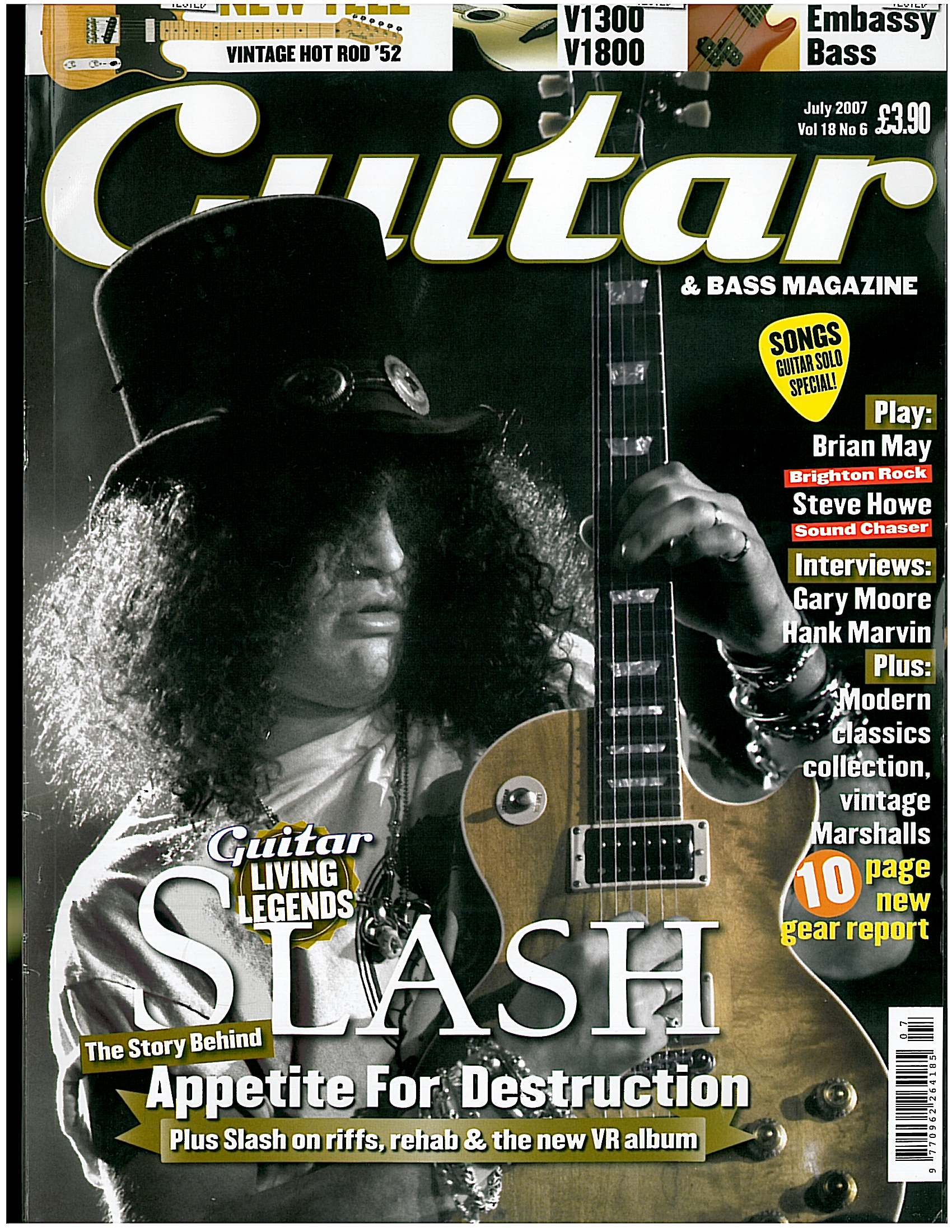
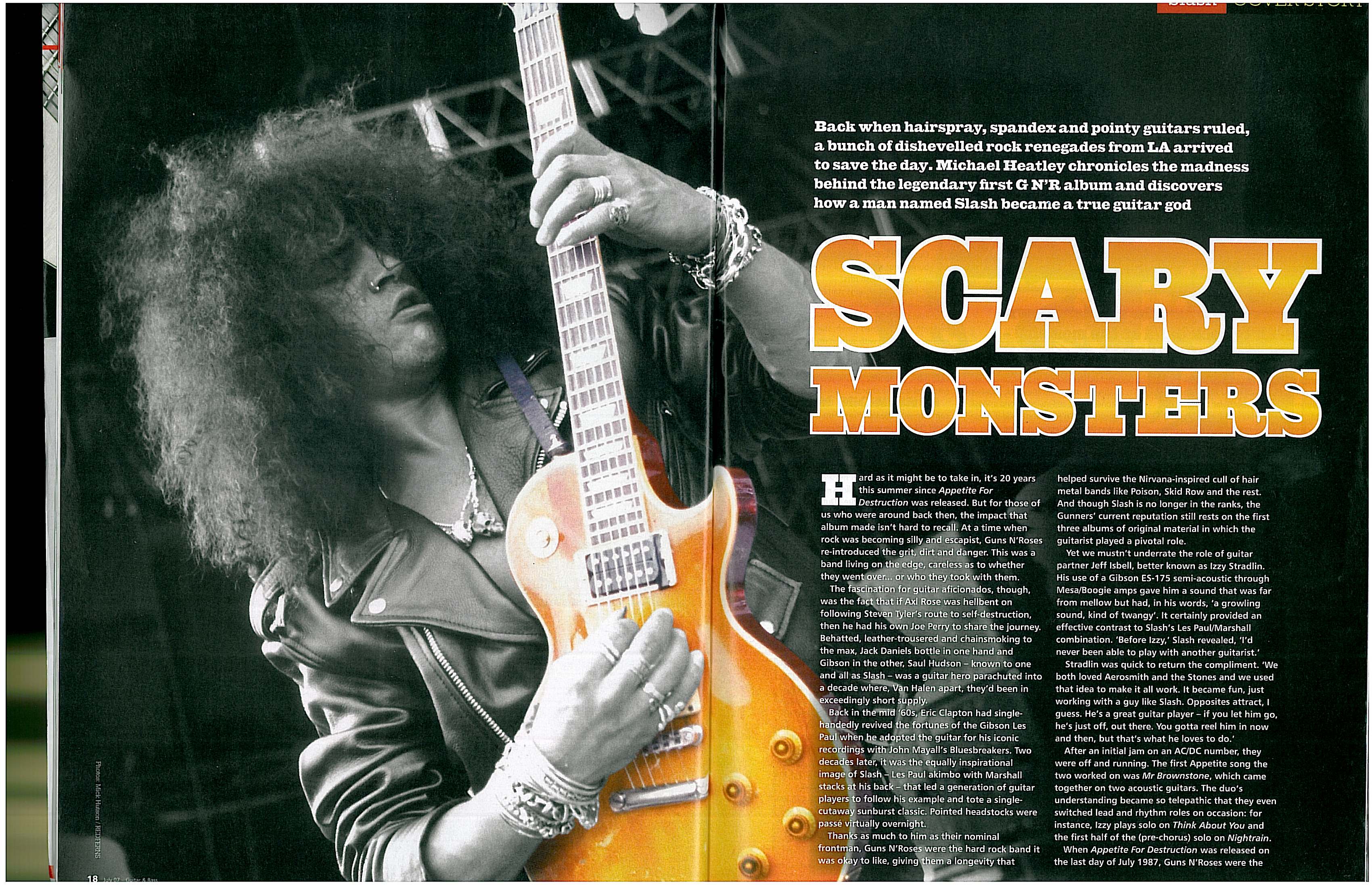
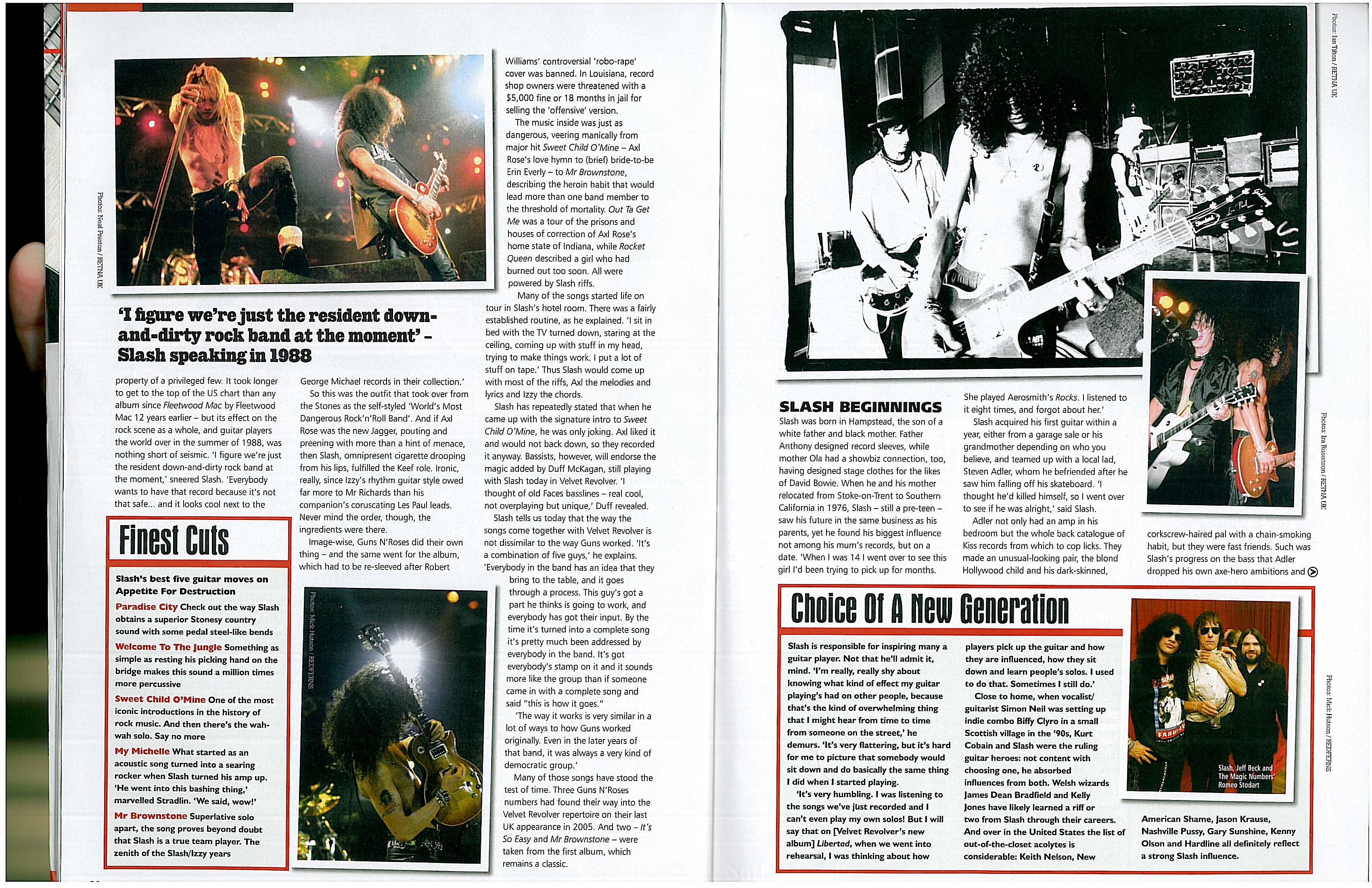
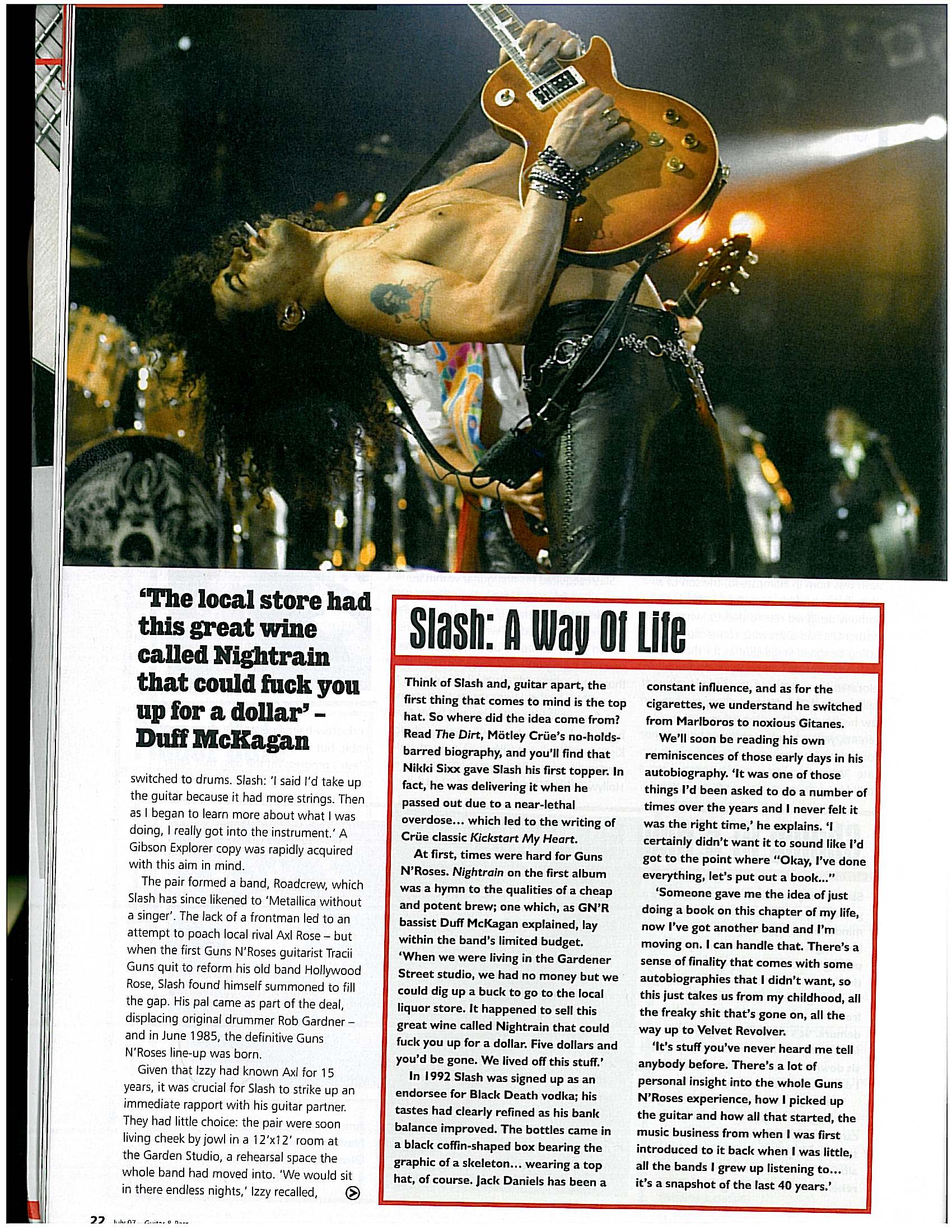
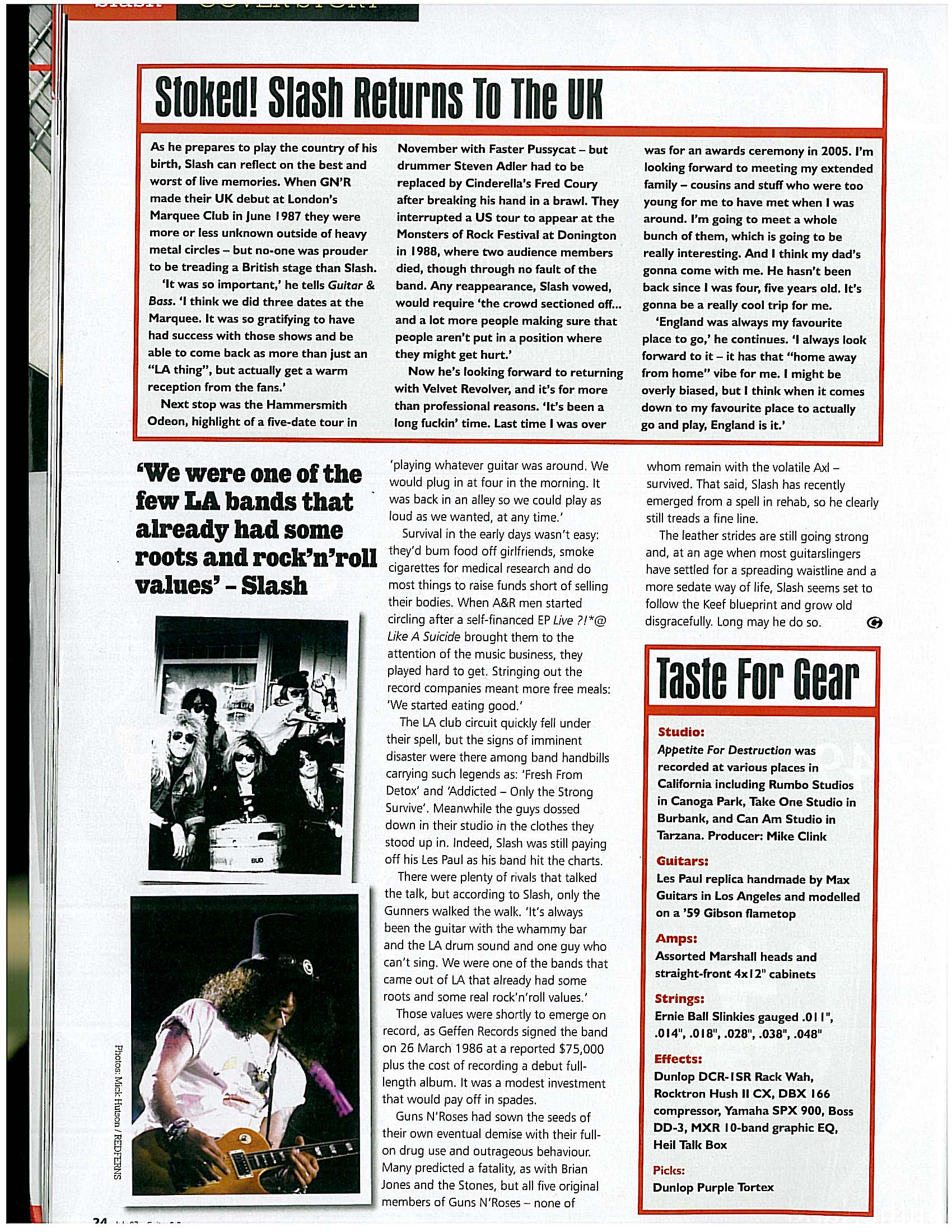
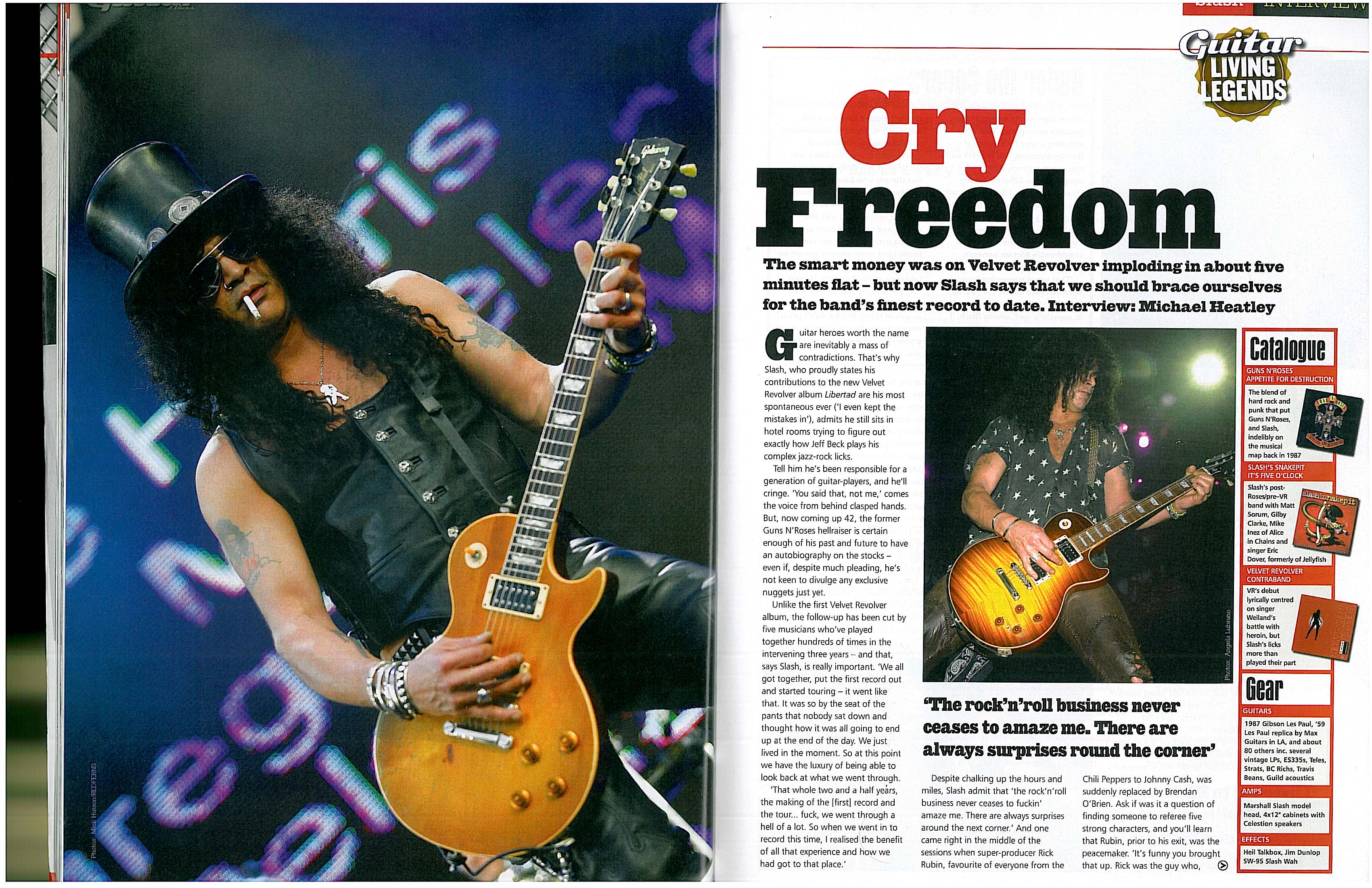
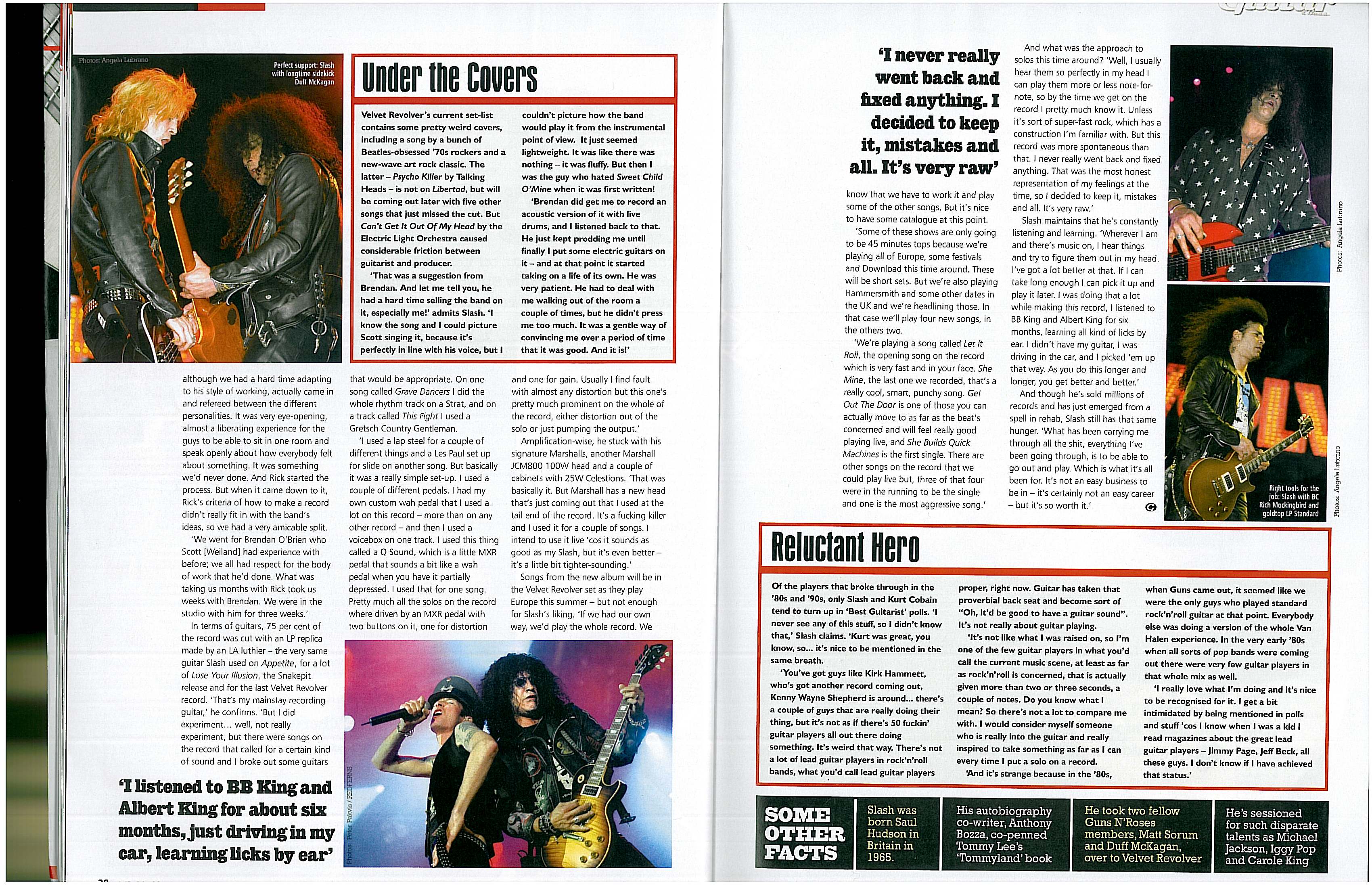
Transcript:
--------------
SCARY MONSTERS
Back when hairspray, spandex and pointy guitars ruled, a bunch of dishevelled rock renegades from LA arrived to save the day. Michael Heatley chronicles the madness behind the legendary first GN’R album and discovers how a man named Slash became a true guitar god
Hard as it might be to take in, it's 20 years this summer since Appetite For Destruction was released. But for those of us who were around back then, the impact that album made isn't hard to recall. At a time when rock was becoming silly and escapist, Guns N' Roses re-introduced the grit, dirt and danger. This was a band living on the edge, careless as to whether they went over... or who they took with them.
The fascination for guitar aficionados, though, was the fact that if Axl Rose was hellbent on following Steven Tyler's route to self-destruction, then he had his own Joe Perry to share the journey. Behatted, leather-trousered and chainsmoking to the max, Jack Daniels bottle in one hand and Gibson in the other, Saul Hudson - known to one and all as Slash - was a guitar hero parachuted into a decade where, Van Halen apart, they'd been in exceedingly short supply.
Back in the mid '60s, Eric Clapton had single- handedly revived the fortunes of the Gibson Les Paul when he adopted the guitar for his iconic recordings with John Mayall's Bluesbreakers. Two decades later, it was the equally inspirational image of Slash - Les Paul akimbo with Marshall stacks at his back - that led a generation of guitar players to follow his example and tote a single-cutaway sunburst classic. Pointed headstocks were passe virtually overnight.
Thanks as much to him as their nominal frontman, Guns N' Roses were the hard rock band it was okay to like, giving them a longevity that helped survive the Nirvana-inspired cull of hair metal bands like Poison, Skid Row and the rest.
And though Slash is no longer in the ranks, the Gunners’ current reputation still rests on the first three albums of original material in which the guitarist played a pivotal role.
Yet we mustn't underrate the role of guitar partner Jeff Isbell, better known as Izzy Stradlin. His use of a Gibson ES-175 semi-acoustic through Mesa/Boogie amps gave him a sound that was far from mellow but had, in his words, 'a growling sound, kind of twangy'. It certainly provided an effective contrast to Slash's Les Paul/Marshall combination. 'Before Izzy,' Slash revealed, 'I'd never been able to play with another guitarist.'
Stradlin was quick to return the compliment. 'We both loved Aerosmith and the Stones and we used that idea to make it all work. It became fun, just working with a guy like Slash. Opposites attract, I guess. He's a great guitar player - if you let him go, he's just off, out there. You gotta reel him in now and then, but that's what he loves to do.'
After an initial jam on an AC/DC number, they were off and running. The first Appetite song the two worked on was Mr Brownstone, which came together on two acoustic guitars. The duo's understanding became so telepathic that they even switched lead and rhythm roles on occasion: for instance, Izzy plays solo on Think About You and the first half of the (pre-chorus) solo on Nightrain.
When Appetite For Destruction was released on the last day of July 1987, Guns N' Roses were the property of a privileged few. It took longer to get to the top of the US chart than any album since Fleetwood Mac by Fleetwood Mac 12 years earlier - but its effect on the rock scene as a whole, and guitar players the world over in the summer of 1988, was nothing short of seismic. 'I figure we're just the resident down-and-dirty rock band at the moment,' sneered Slash. 'Everybody wants to have that record because it's not that safe... and it looks cool next to the George Michael records in their collection.'
So this was the outfit that took over from the Stones as the self-styled ‘World's Most Dangerous Rock 'n' Roll Band'. And if Axl Rose was the new Jagger, pouting and preening with more than a hint of menace, then Slash, omnipresent cigarette drooping from his lips, fulfilled the Keef role. Ironic, really, since Izzy's rhythm guitar style owed far more to Mr Richards than his companion's coruscating Les Paul leads. Never mind the order, though, the ingredients were there.
Image-wise, Guns N' Roses did their own thing - and the same went for the album, which had to be re-sleeved after Robert Williams' controversial 'robo-rape' cover was banned. In Louisiana, record shop owners were threatened with a $5,000 fine or 18 months in jail for selling the 'offensive' version.
The music inside was just as dangerous, veering manically from major hit Sweet Child O' Mine - Axl Rose's love hymn to (brief) bride-to-be Erin Everly - to Mr Brownstone, describing the heroin habit that would lead more than one band member to the threshold of mortality. Out Ta Get Me was a tour of the prisons and houses of correction of Axl Rose's home state of Indiana, while Rocket Queen described a girl who had burned out too soon. All were powered by Slash riffs.
Many of the songs started life on tour in Slash's hotel room. There was a fairly established routine, as he explained. T sit in bed with the TV turned down, staring at the ceiling, coming up with stuff in my head, trying to make things work. I put a lot of stuff on tape.’ Thus Slash would come up with most of the riffs, Axl the melodies and lyrics and Izzy the chords.
Slash has repeatedly stated that when he came up with the signature intro to Sweet Child O' Mine, he was only joking. Axl liked it and would not back down, so they recorded it anyway. Bassists, however, will endorse the magic added by Duff McKagan, still playing with Slash today in Velvet Revolver. 'I thought of old Faces basslines - real cool, not overplaying but unique,' Duff revealed.
Slash tells us today that the way the songs come together with Velvet Revolver is not dissimilar to the way Guns worked. 'It's a combination of five guys,' he explains. 'Everybody in the band has an idea that they bring to the table, and it goes through a process. This guy's got a part he thinks is going to work, and everybody has got their input. By the time it's turned into a complete song it's pretty much been addressed by everybody in the band. It's got everybody's stamp on it and it sounds more like the group than if someone came in with a complete song and said "this is how it goes."
'The way it works is very similar in a lot of ways to how Guns worked originally. Even in the later years of that band, it was always a very kind of democratic group.'
Many of those songs have stood the test of time. Three Guns N' Roses numbers had found their way into the Velvet Revolver repertoire on their last UK appearance in 2005. And two - It's So Easy and Mr Brownstone - were taken from the first album, which remains a classic.
*
Finest cuts
Slash’s best five guitar moves on Appetite For Destruction
Paradise City - Check out the way Slash obtains a superior Stonesy country sound with some pedal steel-like bends
Welcome To The Jungle - Something as simple as resting his picking hand on the bridge makes this sound a million times more percussive
Sweet Child O’ Mine - One of the most iconic introductions in the history of rock music. And then there's the wah- wah solo. Say no more
My Michelle - What started as an acoustic song turned into a searing rocker when Slash turned his amp up. ‘He went into this bashing thing,’ marvelled Stradlin. ‘We said, wow!’
Mr Brownstone - Superlative solo apart, the song proves beyond doubt that Slash is a true team player. The zenith of the Slash/lzzy years
*
Taste For Gear
Studio:
Appetite For Destruction was recorded at various places in California including Rumbo Studios in Canoga Park, Take One Studio in Burbank, and Can Am Studio in Tarzana. Producer: Mike Clink
Guitars:
Les Paul replica handmade by Max Guitars in Los Angeles and modelled on a ’59 Gibson flametop
Amps:
Assorted Marshall heads and straight-front 4x12" cabinets
Strings:
Ernie Ball Slinkies gauged .011", .014", .018", .028", .038", .048"
Effects:
Dunlop DCR-ISR Rack Wah, Rocktron Hush II CX, DBX 166 compressor, Yamaha SPX 900, Boss DD-3, MXR 10-band graphic EQ, Heil Talk Box
Picks:
Dunlop Purple Tortex
*
SLASH BEGINNINGS
Slash was born in Hampstead, the son of a white father and black mother. Father Anthony designed record sleeves, while mother Ola had a showbiz connection, too, having designed stage clothes for the likes of David Bowie. When he and his mother relocated from Stoke-on-Trent to Southern California in 1976, Slash - still a pre-teen - saw his future in the same business as his parents, yet he found his biggest influence not among his mum's records, but on a date. 'When I was 14 I went over to see this girl I'd been trying to pick up for months. She played Aerosmith's Rocks. I listened to it eight times, and forgot about her.'
Slash acquired his first guitar within a year, either from a garage sale or his grandmother depending on who you believe, and teamed up with a local lad, Steven Adler, whom he befriended after he saw him falling off his skateboard. 'I thought he'd killed himself, so I went over to see if he was alright,' said Slash.
Adler not only had an amp in his bedroom but the whole back catalogue of Kiss records from which to cop licks. They made an unusual-looking pair, the blond Hollywood child and his dark-skinned, corkscrew-haired pal with a chain-smoking habit, but they were fast friends. Such was Slash's progress on the bass that Adler dropped his own axe-hero ambitions and switched to drums. Slash: 'I said I'd take up the guitar because it had more strings. Then as I began to learn more about what I was doing, I really got into the instrument.' A Gibson Explorer copy was rapidly acquired with this aim in mind.
The pair formed a band, Roadcrew, which Slash has since likened to 'Metallica without a singer'. The lack of a frontman led to an attempt to poach local rival Axl Rose - but when the first Guns N' Roses guitarist Tracii Guns quit to reform his old band Hollywood Rose, Slash found himself summoned to fill the gap. His pal came as part of the deal, displacing original drummer Rob Gardner - and in June 1985, the definitive Guns N' Roses line-up was born.
Given that Izzy had known Axl for 15 years, it was crucial for Slash to strike up an immediate rapport with his guitar partner. They had little choice: the pair were soon living cheek by jowl in a 12'x12' room at the Garden Studio, a rehearsal space the whole band had moved into. 'We would sit in there endless nights,' Izzy recalled, 'playing whatever guitar was around. We would plug in at four in the morning. It was back in an alley so we could play as loud as we wanted, at any time.'
Survival in the early days wasn't easy: they'd bum food off girlfriends, smoke cigarettes for medical research and do most things to raise funds short of selling their bodies. When A&R men started circling after a self-financed EP Live ?!*@ Like A Suicide brought them to the attention of the music business, they played hard to get. Stringing out the record companies meant more free meals: 'We started eating good.'
The LA club circuit quickly fell under their spell, but the signs of imminent disaster were there among band handbills carrying such legends as: 'Fresh From Detox' and 'Addicted - Only the Strong Survive'. Meanwhile the guys dossed down in their studio in the clothes they stood up in. Indeed, Slash was still paying off his Les Paul as his band hit the charts.
There were plenty of rivals that talked the talk, but according to Slash, only the Gunners walked the walk. 'It's always been the guitar with the whammy bar and the LA drum sound and one guy who can't sing. We were one of the bands that came out of LA that already had some roots and some real rock ’n' roll values.'
Those values were shortly to emerge on record, as Geffen Records signed the band on 26 March 1986 at a reported $75,000 plus the cost of recording a debut full- length album. It was a modest investment that would pay off in spades.
Guns N' Roses had sown the seeds of their own eventual demise with their full- on drug use and outrageous behaviour. Many predicted a fatality, as with Brian Jones and the Stones, but all five original members of Guns N' Roses - none of whom remain with the volatile Axl - survived. That said, Slash has recently emerged from a spell in rehab, so he clearly still treads a fine line.
The leather strides are still going strong and, at an age when most guitarslingers have settled for a spreading waistline and a more sedate way of life, Slash seems set to follow the Keef blueprint and grow old disgracefully. Long may he do so.
*
Choice Of A new Generation
Slash is responsible for inspiring many a guitar player. Not that he’ll admit it, mind. ‘I’m really, really shy about knowing what kind of effect my guitar playing’s had on other people, because that’s the kind of overwhelming thing that I might hear from time to time from someone on the street,’ he demurs. ‘It’s very flattering, but it’s hard for me to picture that somebody would sit down and do basically the same thing I did when I started playing.
‘It’s very humbling. I was listening to the songs we’ve just recorded and I can’t even play my own solos! But I will say that on [Velvet Revolver’s new album] Libertad, when we went into rehearsal, I was thinking about how players pick up the guitar and how they are influenced, how they sit down and learn people’s solos. I used to do that. Sometimes I still do.’
Close to home, when vocalist/ guitarist Simon Neil was setting up indie combo Biffy Clyro in a small Scottish village in the ’90s, Kurt Cobain and Slash were the ruling guitar heroes: not content with choosing one, he absorbed influences from both. Welsh wizards James Dean Bradfield and Kelly Jones have likely learned a riff or two from Slash through their careers. And over in the United States the list of out-of-the-closet acolytes is considerable: Keith Nelson, New American Shame, Jason Krause, Nashville Pussy, Gary Sunshine, Kenny Olson and Hardline all definitely reflect a strong Slash influence.
*
Slash: A way Of Life
Think of Slash and, guitar apart, the first thing that comes to mind is the top hat. So where did the idea come from? Read The Dirt, Motley Crüe’s no-holds- barred biography, and you’ll find that Nikki Sixx gave Slash his first topper. In fact, he was delivering it when he passed out due to a near-lethal overdose... which led to the writing of Crüe classic Kickstart My Heart.
At first, times were hard for Guns N’ Roses. Nightrain on the first album was a hymn to the qualities of a cheap and potent brew; one which, as GN’R bassist Duff McKagan explained, lay within the band’s limited budget.
‘When we were living in the Gardener Street studio, we had no money but we could dig up a buck to go to the local liquor store. It happened to sell this great wine called Nightrain that could fuck you up for a dollar. Five dollars and you’d be gone. We lived off this stuff.’
In 1992 Slash was signed up as an endorsee for Black Death vodka; his tastes had clearly refined as his bank balance improved. The bottles came in a black coffin-shaped box bearing the graphic of a skeleton... wearing a top hat, of course. Jack Daniels has been a constant influence, and as for the cigarettes, we understand he switched from Marlboros to noxious Gitanes.
We’ll soon be reading his own reminiscences of those early days in his autobiography. ‘It was one of those things I’d been asked to do a number of times over the years and I never felt it was the right time,’ he explains. ‘I certainly didn’t want it to sound like I’d got to the point where “Okay, I’ve done everything, let’s put out a book...”
‘Someone gave me the idea of just doing a book on this chapter of my life, now I’ve got another band and I’m moving on. I can handle that. There’s a sense of finality that comes with some autobiographies that I didn’t want, so this just takes us from my childhood, all the freaky shit that’s gone on, all the way up to Velvet Revolver.
‘It’s stuff you’ve never heard me tell anybody before. There’s a lot of personal insight into the whole Guns N’ Roses experience, how I picked up the guitar and how all that started, the music business from when I was first introduced to it back when I was little, all the bands I grew up listening to... it’s a snapshot of the last 40 years.’
*
Stoked! Slash Returns To The UK
As he prepares to play the country of his birth, Slash can reflect on the best and worst of live memories. When GN’R made their UK debut at London's Marquee Club in June 1987 they were more or less unknown outside of heavy metal circles - but no-one was prouder to be treading a British stage than Slash.
‘It was so important,’ he tells Guitar & Bass. ‘I think we did three dates at the Marquee. It was so gratifying to have had success with those shows and be able to come back as more than just an “LA thing”, but actually get a warm reception from the fans.’
Next stop was the Hammersmith Odeon, highlight of a five-date tour in November with Faster Pussycat - but drummer Steven Adler had to be replaced by Cinderella’s Fred Coury after breaking his hand in a brawl. They interrupted a US tour to appear at the Monsters of Rock Festival at Donington in 1988, where two audience members died, though through no fault of the band. Any reappearance, Slash vowed, would require ‘the crowd sectioned off... and a lot more people making sure that people aren’t put in a position where they might get hurt.’
Now he’s looking forward to returning with Velvet Revolver, and it’s for more than professional reasons. ‘It’s been a long fuckin’ time. Last time I was over was for an awards ceremony in 2005. I’m looking forward to meeting my extended family - cousins and stuff who were too young for me to have met when I was around. I’m going to meet a whole bunch of them, which is going to be really interesting. And I think my dad’s gonna come with me. He hasn’t been back since I was four, five years old. It’s gonna be a really cool trip for me.
‘England was always my favourite place to go,’ he continues. ‘I always look forward to it - it has that “home away from home” vibe for me. I might be overly biased, but I think when it comes down to my favourite place to actually go and play, England is it.’
***
Cry Freedom
The smart money was on Velvet Revolver imploding in about five minutes flat - but now Slash says that we should brace ourselves for the band’s finest record to date. Interview: Michael Heatley
Guitar heroes worth the name are inevitably a mass of contradictions. That's why Slash, who proudly states his contributions to the new Velvet Revolver album Libertad are his most spontaneous ever ('I even kept the mistakes in'), admits he still sits in hotel rooms trying to figure out exactly how Jeff Beck plays his complex jazz-rock licks.
Tell him he's been responsible for a generation of guitar-players, and he'll cringe. 'You said that, not me,' comes the voice from behind clasped hands. But, now coming up 42, the former Guns N’ Roses hellraiser is certain enough of his past and future to have an autobiography on the stocks - even if, despite much pleading, he's not keen to divulge any exclusive nuggets just yet.
Unlike the first Velvet Revolver album, the follow-up has been cut by five musicians who’ve played together hundreds of times in the intervening three years - and that, says Slash, is really important. 'We all got together, put the first record out and started touring - it went like that. It was so by the seat of the pants that nobody sat down and thought how it was all going to end up at the end of the day. We just lived in the moment. So at this point we have the luxury of being able to look back at what we went through.
'That whole two and a half years, the making of the [first] record and the tour... fuck, we went through a hell of a lot. So when we went in to record this time, I realised the benefit of all that experience and how we had got to that place.'
Despite chalking up the hours and miles, Slash admit that 'the rock 'n' roll business never ceases to fuckin' amaze me. There are always surprises around the next corner.' And one came right in the middle of the sessions when super-producer Rick Rubin, favourite of everyone from the Chili Peppers to Johnny Cash, was suddenly replaced by Brendan O'Brien. Ask if was it a question of finding someone to referee five strong characters, and you'll learn that Rubin, prior to his exit, was the peacemaker. 'It’s funny you brought that up. Rick was the guy who, although we had a hard time adapting to his style of working, actually came in and refereed between the different personalities. It was very eye-opening, almost a liberating experience for the guys to be able to sit in one room and speak openly about how everybody felt about something. It was something we'd never done. And Rick started the process. But when it came down to it, Rick's criteria of how to make a record didn't really fit in with the band's ideas, so we had a very amicable split.
'We went for Brendan O'Brien who Scott [Weiland] had experience with before; we all had respect for the body of work that he'd done. What was taking us months with Rick took us weeks with Brendan. We were in the studio with him for three weeks.’
In terms of guitars, 75 per cent of the record was cut with an LP replica made by an LA luthier - the very same guitar Slash used on Appetite, for a lot of Lose Your Illusion, the Snakepit release and for the last Velvet Revolver record. 'That's my mainstay recording guitar,' he confirms. 'But I did experiment... well, not really experiment, but there were songs on the record that called for a certain kind of sound and I broke out some guitars that would be appropriate. On one song called Grave Dancers I did the whole rhythm track on a Strat, and on a track called This Fight I used a Gretsch Country Gentleman.
‘I used a lap steel for a couple of different things and a Les Paul set up for slide on another song. But basically it was a really simple set-up. I used a couple of different pedals. I had my own custom wah pedal that I used a lot on this record - more than on any other record - and then I used a voicebox on one track. I used this thing called a Q Sound, which is a little MXR pedal that sounds a bit like a wah pedal when you have it partially depressed. I used that for one song. Pretty much all the solos on the record where driven by an MXR pedal with two buttons on it, one for distortion and one for gain. Usually I find fault with almost any distortion but this one’s pretty much prominent on the whole of the record, either distortion out of the solo or just pumping the output.'
Amplification-wise, he stuck with his signature Marshalls, another Marshall JCM800 100W head and a couple of cabinets with 25W Celestions. 'That was basically it. But Marshall has a new head that's just coming out that I used at the tail end of the record. It's a fucking killer and I used it for a couple of songs. I intend to use it live 'cos it sounds as good as my Slash, but it's even better - it's a little bit tighter-sounding.'
Songs from the new album will be in the Velvet Revolver set as they play Europe this summer - but not enough for Slash's liking. 'If we had our own way, we'd play the whole record. We know that we have to work it and play some of the other songs. But it’s nice to have some catalogue at this point.
'Some of these shows are only going to be 45 minutes tops because we're playing all of Europe, some festivals and Download this time around. These will be short sets. But we're also playing Hammersmith and some other dates in the UK and we're headlining those. In that case we'll play four new songs, in the others two.
'We're playing a song called Let It Roll, the opening song on the record which is very fast and in your face. She Mine, the last one we recorded, that's a really cool, smart, punchy song. Get Out The Door is one of those you can actually move to as far as the beat's concerned and will feel really good playing live, and She Builds Quick Machines is the first single. There are other songs on the record that we could play live but, three of that four were in the running to be the single and one is the most aggressive song.'
And what was the approach to solos this time around? 'Well, I usually hear them so perfectly in my head I can play them more or less note-for- note, so by the time we get on the record I pretty much know it. Unless it’s sort of super-fast rock, which has a construction I'm familiar with. But this record was more spontaneous than that. I never really went back and fixed anything. That was the most honest representation of my feelings at the time, so I decided to keep it, mistakes and all. It's very raw.'
Slash maintains that he's constantly listening and learning. 'Wherever I am and there's music on, I hear things and try to figure them out in my head. I've got a lot better at that. If I can take long enough I can pick it up and play it later. I was doing that a lot while making this record, I listened to BB King and Albert King for six months, learning all kind of licks by ear. I didn't have my guitar, I was driving in the car, and I picked 'em up that way. As you do this longer and longer, you get better and better.'
And though he's sold millions of records and has just emerged from a spell in rehab, Slash still has that same hunger. 'What has been carrying me through all the shit, everything I've been going through, is to be able to go out and play. Which is what it's all been for. It's not an easy business to be in - it's certainly not an easy career - but it's so worth it.'
*
Under the Covers
Velvet Revolver’s current set-list contains some pretty weird covers, including a song by a bunch of Beatles-obsessed ’70s rockers and a new-wave art rock classic. The latter - Psycho Killer by Talking Heads - is not on Libertad, but will be coming out later with five other songs that just missed the cut. But Can't Get It Out Of My Head by the Electric Light Orchestra caused considerable friction between guitarist and producer.
‘That was a suggestion from Brendan. And let me tell you, he had a hard time selling the band on it, especially me!’ admits Slash. ‘I know the song and I could picture Scott singing it, because it’s perfectly in line with his voice, but I couldn’t picture how the band would play it from the instrumental point of view. It just seemed lightweight. It was like there was nothing - it was fluffy. But then I was the guy who hated Sweet Child O’ Mine when it was first written!
‘Brendan did get me to record an acoustic version of it with live drums, and I listened back to that. He just kept prodding me until finally I put some electric guitars on it - and at that point it started taking on a life of its own. He was very patient. He had to deal with me walking out of the room a couple of times, but he didn’t press me too much. It was a gentle way of convincing me over a period of time that it was good. And it is!’
*
Reluctant Hero
Of the players that broke through in the ’80s and ’90s, only Slash and Kurt Cobain tend to turn up in ‘Best Guitarist’ polls. ‘I never see any of this stuff, so I didn’t know that,’ Slash claims. ‘Kurt was great, you know, so... it’s nice to be mentioned in the same breath.
‘You’ve got guys like Kirk Hammett, who’s got another record coming out, Kenny Wayne Shepherd is around... there’s a couple of guys that are really doing their thing, but it’s not as if there's 50 fuckin’ guitar players all out there doing something. It’s weird that way. There’s not a lot of lead guitar players in rock ’n’ roll bands, what you’d call lead guitar players proper, right now. Guitar has taken that proverbial back seat and become sort of “Oh, it’d be good to have a guitar sound’’. It’s not really about guitar playing.
‘It’s not like what I was raised on, so I’m one of the few guitar players in what you’d call the current music scene, at least as far as rock ’n’ roll is concerned, that is actually given more than two or three seconds, a couple of notes. Do you know what I mean? So there’s not a lot to compare me with. I would consider myself someone who is really into the guitar and really inspired to take something as far as I can every time I put a solo on a record.
‘And it’s strange because in the ’80s, when Guns came out, it seemed like we were the only guys who played standard rock ’n’ roll guitar at that point. Everybody else was doing a version of the whole Van Halen experience. In the very early '80s when all sorts of pop bands were coming out there were very few guitar players in that whole mix as well.
‘I really love what I'm doing and it’s nice to be recognised for it. I get a bit intimidated by being mentioned in polls and stuff ’cos I know when I was a kid I read magazines about the great lead guitar players - Jimmy Page, Jeff Beck, all these guys. I don’t know if I have achieved that status.’
*
SOME OTHER FACTS
- Slash was born Saul Hudson in Britain in 1965.
- His autobiography co-writer, Anthony Bozza, co-penned Tommy Lee’s ‘Tommyland’ book.
- He took two fellow Guns N’ Roses members, Matt Sorum and Duff McKagan, over to Velvet Revolver.
= He’s sessioned for such disparate talents as Michael Jackson, Iggy Pop and Carole King.
*
Catalogue
GUNS N'ROSES - APPETITE FOR DESTRUCTION: The blend of hard rock and punk that put Guns N' Roses, and Slash, indelibly on the musical map back in 1987
SLASH’S SNAKEPIT - IT’S FIVE O’CLOCK: Slash's post- Roses/pre-VR band with Matt Sorum, Gilby Clarke, Mike Inez of Alice in Chains and singer Eric Dover, formerly of Jellyfish
VELVET REVOLVER – CONTRABAND: VR's debut lyrically centred on singer Weiland's battle with heroin, but Slash's licks more than played their part
Gear
GUITARS
1987 Gibson Les Paul, '59 Les Paul replica by Max Guitars in LA, and about 80 others inc. several vintage LPs, ES335s, Teles, Strats, BC Richs, Travis Beans, Guild acoustics
AMPS
Marshall Slash model head, 4x12” cabinets with Celestion speakers
EFFECTS
Heil Talkbox, Jim Dunlop SW-95 Slash Wah

Soulmonster- Band Lawyer
-

Posts : 15970
Plectra : 77382
Reputation : 830
Join date : 2010-07-06
 Similar topics
Similar topics» 2007.12.05 - Switched - Slash Talks Guitar Hero III, 'Slash' (the Book), and Gadget Gifts
» 2007.10.27 - Guitar Hero III - Making of with Slash
» 2007.03.DD - Guitar Edge - Back To The Jungle (Slash)
» 2007.07.DD - Total Guitar - Velvet Revolver (Slash)
» 2007.05.DD - Total Guitar - All Guns Blazing (Slash)
» 2007.10.27 - Guitar Hero III - Making of with Slash
» 2007.03.DD - Guitar Edge - Back To The Jungle (Slash)
» 2007.07.DD - Total Guitar - Velvet Revolver (Slash)
» 2007.05.DD - Total Guitar - All Guns Blazing (Slash)
Page 1 of 1
Permissions in this forum:
You cannot reply to topics in this forum
